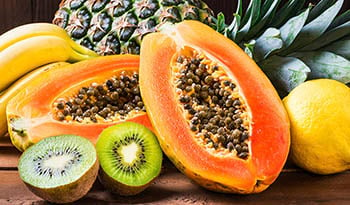Synbiotics: What They Are + Benefits For Gut Health

Probiotics vs. Prebiotics
You’ve likely heard the terms probiotic and prebiotic, but what do they really mean? Let’s start with the basics:
- Probiotics are live beneficial bacteria that help maintain the natural balance of gut microbiota. They play a critical role in supporting digestion, nutrient absorption, and immune function.
- Prebiotics, on the other hand, serve as food for these beneficial bacteria. By stimulating the growth and activity of gut microbiota, prebiotics contribute to overall gut health.
What Are Synbiotics?
Now, let’s explore synbiotics—a combination of probiotics and prebiotics in a single product. Scientific evidence supports the synergistic benefits of synbiotics, which can surpass the effects of either component alone. For example, an 8-week randomized controlled trial published in Techniques in Coloproctology (2014) found that synbiotic supplementation significantly improved stool consistency, reduced intestinal transit time, and enhanced gut microbiota composition.1
Another study showed that a combination of Bacillus coagulans and inulin reduced inflammation by lowering C-reactive protein levels and increasing glutathione levels.2 Synbiotics have also demonstrated anti-inflammatory effects in animal models, improving histological changes in inflammation-prone HLA-B27 rats.3 Finally, in vitro studies have highlighted the potential of synbiotics, with evidence showing that supplementation prevented a chemical-induced suppression of immune cells in the gut (called NK cells), a benefit that wasn’t seen with probiotics or prebiotics alone.4
Together, these findings underscore the potential of synbiotics to improve gut health, reduce inflammation, and support immune function, making them a powerful addition to functional food and dietary supplement strategies.
What Do Synbiotics Do?
Synbiotics were developed to address the survival challenges faced by probiotics. Research suggests that Synbiotics enhance the survival and colonization of probiotic bacteria during their transit through the upper gastrointestinal tract by selectively stimulating the growth or activating the metabolism of health-promoting probiotic bacteria.5 Additionally, Synbiotics may promote more efficient colonization in the colon and stimulate the growth of both probiotics and commensal bacteria, helping to maintain intestinal homeostasis and overall health.6
Who Benefits From Synbiotics?
Whether you’re an athlete, fitness enthusiast, or simply someone aiming to improve digestive health, Synbiotics may help with the following:
- Enhance gut microbiota diversity.
- Promote better nutrient absorption.
- Reduce gastrointestinal discomfort.
- Enhance immune function.
- Improve athletic recovery and performance.
Final Thoughts
Emerging research suggests that combining prebiotics and probiotics as a synbiotic amplifies their benefits.
References:
- Bazzocchi, G., Giovannini, T., Giussani, C., Brigidi, P., & Turroni, S. (2014). Effect of a new synbiotic supplement on symptoms, stool consistency, intestinal transit time and gut microbiota in patients with severe functional constipation: a pilot randomized double-blind, controlled trial. Techniques in coloproctology, 18(10), 945–953. https://doi.org/10.1007/s10151-014-1201-5
- Panda, Arun & Rao, Savaram & Raju, M V L N & Sharma, Sita. (2006). Dietary Supplementation of Lactobacillus Sporogenes on Performance and Serum Biochemico-Lipid Profile of Broiler Chickens. Journal of Poultry Science - J POULT SCI. 43. 235-240. 10.2141/jpsa.43.235.
- Saulnier, D. M., Spinler, J. K., Gibson, G. R., & Versalovic, J. (2009). Mechanisms of probiosis and prebiosis: considerations for enhanced functional foods. Current opinion in biotechnology, 20(2), 135–141. https://doi.org/10.1016/j.copbio.2009.01.002
- Fotiadis, C. I., Stoidis, C. N., Spyropoulos, B. G., & Zografos, E. D. (2008). Role of probiotics, prebiotics and synbiotics in chemoprevention for colorectal cancer. World journal of gastroenterology, 14(42), 6453–6457. https://doi.org/10.3748/wjg.14.6453
- de Vrese, M., & Schrezenmeir, J. (2008). Probiotics, prebiotics, and synbiotics. Advances in biochemical engineering/biotechnology, 111, 1–66. https://doi.org/10.1007/10_2008_097
- Peña A. S. (2007). Flora intestinal, probióticos, prebióticos, simbióticos y alimentos novedosos [Intestinal flora, probiotics, prebiotics, symbiotics and novel foods]. Revista espanola de enfermedades digestivas, 99(11), 653–658. https://doi.org/10.4321/s1130-01082007001100006
- Whelan, K., Martin, L. D., Staudacher, H. M., & Lomer, M. C. E. (2018). The low FODMAP diet in the management of irritable bowel syndrome: an evidence-based review of FODMAP restriction, reintroduction and personalisation in clinical practice. Journal of human nutrition and dietetics: the official journal of the British Dietetic Association, 31(2), 239–255. https://doi.org/10.1111/jhn.12530
DISCLAIMER:This Wellness Hub does not intend to provide diagnosis...
















































































 Table of Contents
Table of Contents















